| Conferences > Circulating Biomarkers, Exosomes & Liquid Biopsy Europe 2019 > Keynote Speakers |
| Register | Login |
Lorena DiéguezLeader of the Medical Devices Research Group, INL- International Iberian Nanotechnology Laboratory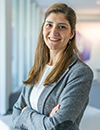 Lorena Diéguez joined INL in 2014 as a Staff Researcher and is, since 2018, the leader of the Medical Devices research group. Her research is mainly devoted to Translational Medical Research in close collaboration with hospitals and focuses on the development of tools and solutions based on microfluidics, biosensors and nanotechnology towards early diagnosis and better understanding of diseases. She is also very interested in translating her technology from the lab to the clinic and is co-founder and CEO of the spin-off company RUBYnanomed in the field of liquid biopsy. Currently, she is also the Chair of the Working Group in Medical Devices at the ETPN (European Technology Platform in Nanomedicine). She obtained her Bachelors in Physics with a Major in Optoelectronics at the University of Santiago de Compostela in 2005, then completed her Masters in Nanotechnology at the University of Barcelona (UB) in 2007 and her PhD in Biosensors at the UB, the Institute for Bioengineering of Catalonia and the ETH Zürich. Her postdoc at the University of South Australia (2010-2013) was devoted to the study of rare cells from biological samples using microfluidics. |
Esther Nolte-‘t HoenAssistant Professor, Department of Biochemistry & Cell Biology, Faculty of Veterinary Medicine, Utrecht University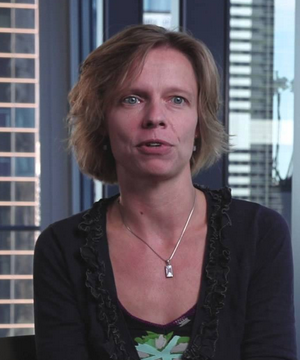 Dr. Esther Nolte-‘t Hoen did her PhD (2003) on regulation of T cell responses in the lab of Professor Wauben at Utrecht University, The Netherlands. At this early stage, she discovered that T cells can modulate the function of antigen presenting cells by transferring proteins via small extracellular vesicles. As a post-doctoral fellow in Prof. Daniel Davis’ laboratory at Imperial College London, Nolte-‘t Hoen further explored the cell biology of immune cell interactions using state-of-the-art microscopical techniques. After a second post-doc at Utrecht University, she was appointed Assistant Professor in 2013. Her research focuses on the role of extracellular vesicles in communication between immune cells at steady state and during microbial infection. Within this topic, she puts strong focus on technical aspects of extracellular vesicle purification, methods for high-throughput individual vesicle analysis, the RNA content of extracellular vesicles, and the interplay between vesicles and viruses. Nolte-‘t Hoen was awarded a European Research Council Starting Grant (1500 k€) in 2013 to explore parallel mechanisms underlying the formation of viruses and extracellular vesicles. Nolte-‘t Hoen is an active member of the International Society of Extracellular Vesicles and in 2015 organized an international research seminar for this society on how the function of extracellular vesicle-associated RNA can be unraveled. |
Takahiro OchiyaProfessor, Department of Molecular and Cellular Medicine, Tokyo Medical University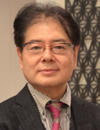 Dr. Takahiro Ochiya was a Chief of Division of Molecular and Cellular Medicine at the National Cancer Center Research Institute, Tokyo since 2011 and he is currently appointed as professor of Tokyo Medical University (since 2018). After he got Ph.D. in 1988 in Osaka University and then went to do a post-doc at La Jolla Cancer Research (Burnham Institute for Medical Research), CA, USA. Dr. Ochiya’s lab focuses the development of novel animal models, methods, and strategies to study cancer development and metastasis. Especially, current focuses are siRNA- and microRNA-based therapy against cancer stem cells. Dr. Ochiya is one of top scientist in Exosome research in cancer area and carries President of Japanese Society of Extracellular Vesicles (JSEV) since 2014. |
Patrizia Paterlini-BrechotProfessor of Oncology/Molecular Biology, University Paris Descartes Patrizia Paterlini-Brechot, MD, PhD, is Oncologist, Hematologist and Molecular Biologist. She is a Professor of Oncology/Molecular Biology at Paris Descartes University- Necker Hospital, with a triple task of research leader, academic teacher and hospital practitioner. Prof. Paterlini-Brechot developed and patented with her team the method ISET (Isolation by SizE of Tumor/Trophoblastic cells) allowing the sensitive isolation from blood of intact circulating tumor and fetal cells without loss and without the use of antibodies, now recognized as a breakthrough in the fields of predictive oncology and non-invasive prenatal diagnosis. ISET has been proven to allow early detection of tumor invasion as a way to diagnose invasive cancers before imaging. The same ISET approach, followed by single cell molecular analyses, has been proven to provide non-invasive prenatal diagnosis of recessive disorders like cystic fibrosis and spinal muscular atrophy and is potentially valid for all types of genetic disorders. |
Graham PockleyDirector and Professor, John van Geest Cancer Research Centre, Nottingham Trent University, CEO, multimmune GmbH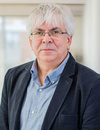 Professor A. Graham Pockley, PhD is the CEO of multimmune GmbH (www.multimmune.com), Munich, Germany. multimmune’s unique and proprietary technology platform is based on the discovery (by Gabriele Multhoff and Claus Botzler) that a cell surface bound form of Hp70 is selectively and widely expressed on the plasma membranes of many tumour entities. multimmune is developing innovative theranostics on the basis of membrane Hsp70 expression by tumour cells, including an autologous NK cell-based therapy (ENKASTIMev) |
Dominique PV de KleijnProfessor Experimental Vascular Surgery, Professor Netherlands Heart Institute, University Medical Center Utrecht, The Netherlands Prof. Dr. Dominique PV de Kleijn is molecular biologist and chemist and professor of Exp. Vascular Surgery at UMC Utrecht and professor at the Netherlands Heart Institute. From 2012 to 2016, he was Research Professor of Surgery at NUS/NUHS and preclinical director of the Cardiovascular Research Institute (CVRI) Singapore. He was until 2016 professor of Cardiovascular Immunology and co-chair of Experimental Cardiology at UMC Utrecht. Since 1997 he is coordinating cardiovascular research from basic science, animal myocardial infarction and atherosclerotic studies (pig and sheep) towards clinical biobanking studies. His research interests are: The innate immune system in cardiovascular disease and atherosclerosis & Biomarkers predictive for primary & secondary events with a focus on plasma extracellular vesicles. He has more then 275 publications and a H-factor of 78. |
Leon TerstappenChair Medical CellBiophysics, MIRA Research Institute for Biomedical Technology and Technical Medicine, University of Twente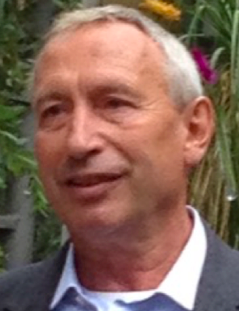 Professor Leon WMM Terstappen, MD, PhD is chair of the department of Medical Cell BioPhysics at the University of Twente, The Netherlands. He received his medical degree from the University of Groningen in 1983 and his PhD in 1988 from the University of Twente. In 1987 he started as post-doctoral fellow at the research department of Becton Dickinson Immunocytometry systems in Mountain View CA, USA and held various research positions thereafter. In 1994 he started as Chief Scientific Officer at Immunicon Corporation, Huntingdon Valley, PA, USA and in 2007 he was appointed at the University of Twente. He is an international recognized expert in cytometry and pioneered the detection of rare cells. He was in charge of the development of the CellSearch system, the only FDA cleared platform to enumerate circulating cancer cells in blood, which was awarded the “Prix Galien”, the major prize for in-vitro diagnostics devices. He currently is the program leader of the STW Perspectief program Cancer-ID and co-leader of the EU IMI program CANCER-ID both programs aim to develop and validate “liquid biopsies” technologies for personalized cancer care. Terstappen is a recipient of the Max Fulwyler Award for Innovative Excellence. |




